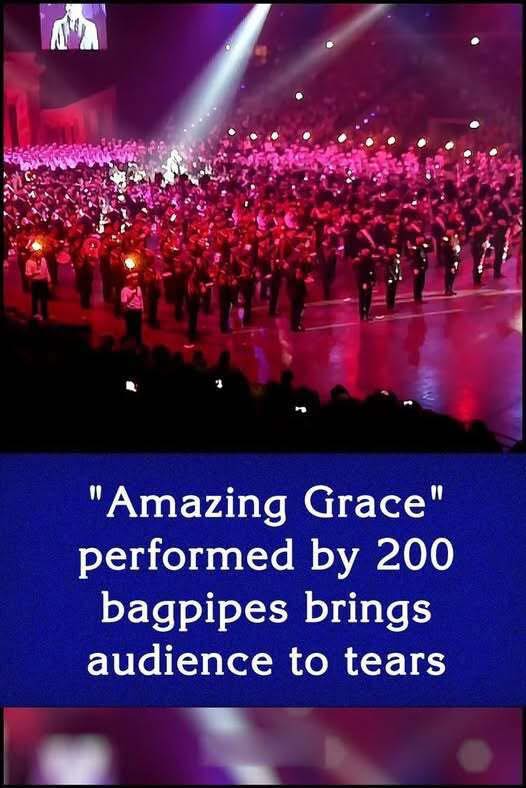This Might Be the Most Powerful Rendition of “Amazing Grace” Ever Heard

Since the earliest days of humanity, music has been more than just sound—it’s been a lifeline. A universal language that transcends borders, beliefs, and generations, music has the rare ability to speak directly to the soul. It stirs something deep within us, often expressing what words alone cannot. It brings comfort in sorrow, strength in hardship, and connection in moments when we feel alone.
In a world where trends come and go with the tap of a screen, only a few songs have the power to endure. These aren’t just popular melodies—they’re spiritual anchors, passed from generation to generation because they speak timeless truths. Their lyrics echo through moments of triumph and tragedy, and their notes offer familiarity and hope.
One such song is the beloved hymn “Amazing Grace.”
Penned in 1772 by John Newton, a former slave trader who underwent a powerful spiritual transformation, the song is a raw and redemptive cry from a man who saw the worst in himself and the world—and still chose to believe in grace. Over centuries, Amazing Grace has become more than a hymn; it’s a message of hope, of forgiveness, of starting over. It’s sung at funerals and baptisms, in churches and on battlefields. It is a balm for broken hearts, a light for the lost.
For me, this song has always held a quiet power. Whenever I hear its familiar melody, a stillness washes over me. I feel anchored—reminded of where I’ve been, who I’ve lost, and what I’ve survived. Yet nothing prepared me for the version that changed everything I thought I knew about this timeless song.
It was unlike any performance I’d ever encountered: 200 bagpipes, swelling together with one human voice, creating a wave of sound that seemed to rise from the earth itself. It didn’t just stir emotions—it opened a floodgate of reflection, reverence, and awe.
The moment began humbly, with one man singing the opening verse. His voice, clear and steady, was joined by a single haunting bagpipe. Together, they carried the melody gently, like a prayer being whispered into the wind. Then, as the second verse began, the full ensemble emerged. Two hundred bagpipes joined in—each one adding to the deep, resonant wall of sound. It was powerful. Majestic. Almost otherworldly.
What happened in that moment wasn’t just musical—it was spiritual.
As the sound swelled, something ancient stirred in me. The unity of the pipes, the emotion in the singer’s voice, the sheer scale of it all—it was like the past and present collapsing into one breathtaking experience. Time stood still. The world around me faded. All that remained was the music, and the wave of emotion it carried with it.
That performance didn’t just move me—it transformed me.
As the notes soared, I thought of everything: the people I’ve lost, the pain I’ve carried, the grace I’ve received even when I didn’t think I deserved it. I found myself remembering simple things I usually forget to appreciate—like the way my grandmother used to hum the song while cleaning, or how my father’s eyes would well up when he heard it. I felt the power of those memories—and the peace that came with them.
Amazing Grace is one of those rare pieces of music that meets you wherever you are in life. For some, it’s a religious hymn. For others, it’s a tribute, a source of comfort, a symbol of strength. No matter how it enters your life, it tends to stay—and grow with you.
And this particular version—fused with voice and the echo of 200 bagpipes—is something I believe everyone should experience at least once. It revives the song in a way that’s fresh yet deeply respectful of its roots. It reminds us that music doesn’t age. It evolves, adapts, and continues to speak to the deepest parts of who we are.
As the final notes of that performance faded into silence, something sacred remained. Not just the echo of a powerful song—but a sense of clarity. A reminder that grace exists, even in the chaos. That music can still unify us. That, in the right moment, a song can change everything.
Amazing Grace isn’t just a melody. It’s a vessel—for healing, for remembrance, for connection. And in this unforgettable performance, it proves once again why it remains one of the most enduring songs of all time.
If you haven’t heard this version yet, take a moment and find it. Close your eyes. Let it wash over you. And when the last note lingers, allow yourself to be still. To reflect. To feel. To remember that even in a noisy, restless world, there’s still beauty worth pausing for.
Because sometimes, the songs that carry us are the ones we thought we already knew—until something extraordinary makes us hear them for the very first time.